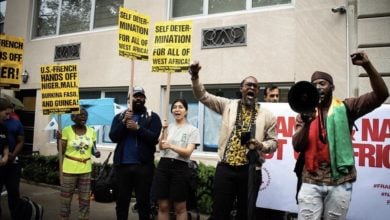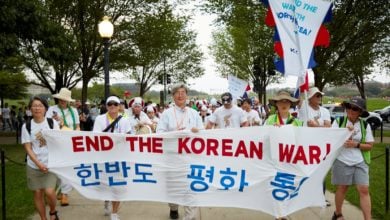The confrontation between the Bush administration and the Democratic Peoples Republic of Korea, or North Korea, has entered its next stage. North Korea, frustrated by the endless threats and financial sanctions imposed by the U.S. government over the past five years, dramatically announced that it had become the ninth country to possess nuclear weapons by carrying out its first nuclear test on Oct. 9.
Now the United States and North Korea have agreed to return to what is known as the six-party negotiations. North
 |
Following the nuclear test, the Bush administration went into emergency mode rallying the U.N. Security Council to condemn North Korea. It set the stage for a wider conflict.
North Korea did not blink even in the face of public criticism by the People’s Republic of China, one of its key allies. North Korea made the point that the United States possesses thousands of nuclear weapons and is still technically at war with the country. The U.S. government refuses to sign a formal peace treaty ending the U.S.-Korean war of 1950-53.
North Korea assumed that the U.S. government, with 150,000 soldiers bogged down in Iraq by the armed resistance, would find it difficult to launch another war thousands of miles away. North Korea decided to move forward boldly, hoping that its possession of nuclear weapons would help ward off a potential U.S. attack.
The government of North Korea made it evident that its primary goal was to compel the United States to end the hostility and normalize relations between the two countries. Bush had menacingly labeled North Korea part of the “axis of evil” along with Iraq and Iran.
Background to the six-party talks
Following recent meetings between North Korea, China and the United States, it was announced that six-party talks will resume this month or in December. The six-party talks—involving North Korea, South Korea, the United States, Japan, China and Russia—previously took place between August 2003 and November 2005.
During the September 2005 round, the parties agreed to issue a joint statement and meet again in November. The statement included an agreement from North Korea to freeze its nuclear weapons program in exchange for agreements on economic cooperation in energy, trade and investment.
Just days after the agreement was reached, the U.S. Treasury Department took new aggressive steps. It designated Banco Delta Asia in Macau as a “primary money laundering concern” under Section 311 of the Patriot Act, accusing it of illegal dealings with North Korea. The bank froze North Korea’s accounts, which amounted to U.S.$24 million.
Other banks suspended or limited their dealings with North Korea soon thereafter. These actions effectively curtailed the north’s ability to conduct international commerce. The moves amounted to an unofficial imposition of financial sanctions.
The November round of the six-party talks took place as scheduled. But no additional meetings occurred after November 2005.
In April 2006, North Korea made clear that it would resume talks only if Washington lifted the financial sanctions. Top nuclear negotiator Kim Kye-gwan said, “The minute we have the funds. … I will be at the talks.” (BBC, April 13)
U.S. accepted North Korean proposal
Park Yong-Jin, a spokesman for Democratic Labor Party of South Korea, reported to the press comments made by Kim Yong-Nam, chairman of the presidium of North Korea’s Supreme People’s Assembly, during a meeting in North Korea.
Kim reportedly explained how the agreement to resume the talks was reached: “We proposed the two sides hold the six-party talks first and discuss ways to lift the financial sanctions, if the United States was unable to lift the sanctions before the talks for fear of losing face. … The United States accepted this proposal and that’s how the six-party talks are going to be resumed.”
The Bush administration’s public announcements about resuming the talks paint them as victorious over North Korea. They claim to have forced North Korea back to the table. But, in reality, North Korea has forced the Bush administration to make concessions prior to the resumption of talks.
According to a North Korean Foreign Ministry spokesperson, the Koreans decided to return to the talks “on the premise that the issue of lifting financial sanctions will be discussed and settled between the DPRK and the U.S. within the framework of the six-party talks.” This is a marked shift from the previous U.S. position.
The New York Times reported that, while U.S. secretary of state Condoleezza Rice was in China on October 20, “Ms. Rice stressed that North Korea should return to those talks ‘without condition,’ and that the financial restrictions the United States has imposed to crack down on North Korean counterfeiting would not be lifted just to entice the North back to the negotiations.”
U.S. government officials have consistently asserted that there is no relationship between the financial sanctions and the six-party talks.
On June 29, Christopher R. Hill, assistant secretary of state for East Asian and Pacific affairs, said, “The D.P.R.K. calls
|
But by Oct. 31, after the announcement of the return to talks, Hill had changed his tune to reflect the new political situation: “We agreed that we could—that we will find a mechanism within the six-party process to address these financial measures, that we would—it would probably be some kind of a working group to deal with this, and that we would try to address it that way. Of course, addressing it will require—this needs to be done with the cooperation of the DPRK and of course addressing the problem that caused this whole issue, which is the illicit activities.”
A New York Times editorial from Nov. 5 clarified that the relationship of forces has shifted since North Korea carried out the nuclear test.. Rather than blaming North Korea for the previous end of the six-party talks, the Times put the onus on the Bush administration. “Last year President Bush agreed to offer economic and security incentives to North Korea [September 2005 agreement]. And Pyongyang may—or may not—have agreed to give up its weapons. But we never got to find out because Washington quickly undercut its own offer, imposing tough new financial sanctions, ostensibly to punish the North for selling counterfeit dollars. The North walked away from the table.”
The Times also issued a directive to the Bush administration: “It is also not the time for more unilateral American sanctions, intemperate rhetoric or anything else administration hawks might cook up to scuttle the talks. If President Bush is serious about trying to negotiate his way out of the nightmare of a nuclear-armed North Korea, he needs to end debate within his administration and empower Secretary of State Condoleezza Rice to cut the best deal she can. She should start with a clear pledge that the United States will not try to overthrow the North Korean government if it gives up its weapons program.”
Regime change remains U.S. perspective
Despite occasional assertions to the contrary, the overthrow of the North Korean government has been the objective of the U.S. government—Democratic and Republican administrations alike—since 1945. While it has utilized a variety of tactics over the past 61 years, its goal has been taking control of the Korean peninsula.
The shift in tactics from threats of war to negotiations also occurred during the Clinton administration. In 1994, the U.S. government was on the verge of initiating military action against North Korea. The issue then was North Korea’s plan to develop nuclear power as a new energy source.
But instead of going to war, the two sides signed the General Framework Agreement. North Korea agreed to freeze the construction of a nuclear power plant in exchange for the U.S. government building substitute nuclear plants to provide energy. Washington also agreed to ship 500,000 tons of oil annually to North Korea until the light-water reactors were up and running and to ease and, ultimately, end economic sanctions.
North Korea complied fully with the agreement’s terms. The Clinton administration, however, never fulfilled its part of the agreement.
What was the Clinton administration’s plan?
On Oct. 26, the National Security Archive posted declassified CIA documents from 1997 that predicted the North Korean government’s collapse within five years. This guided the Clinton administration’s perspective—U.S. government officials were waiting for an imminent collapse.
North Korea, however, soon proved that it was not collapsing, but instead gaining strength. On Aug. 31, 1998, North Korea fired a multistage missile into the Pacific Ocean. The missile flew over Japanese territory.
After the missile test, the Clinton administration moved toward further negotiations. This was signaled most clearly when then-secretary of state Madeleine Albright became the highest ranking U.S. official ever to visit North Korea in October 2000.
As one of his first acts in office, in March of 2001, Bush suspended all talks with North Korea.
Threat of escalation remains
Despite the upcoming six-party talks, progressive people and organizations in the United States must be prepared for a possible escalation.
Rodong Sinmun, the newspaper of the Central Committee of the Workers’ Party of Korea, reported on Nov. 2: “The tension on the Korean Peninsula now has been pushed to the worst crisis by the U.S. imperialists’ hostile policy toward the DPRK. The U.S. is working round the clock to bring into shape an international siege to the DPRK through sanctions and blockade against it. What they seek in this is to push the inter-Korean relations to a rupture and create a phase of confrontation and war by inveigling south Korea into the maneuvers of sanctions and blockade.”







